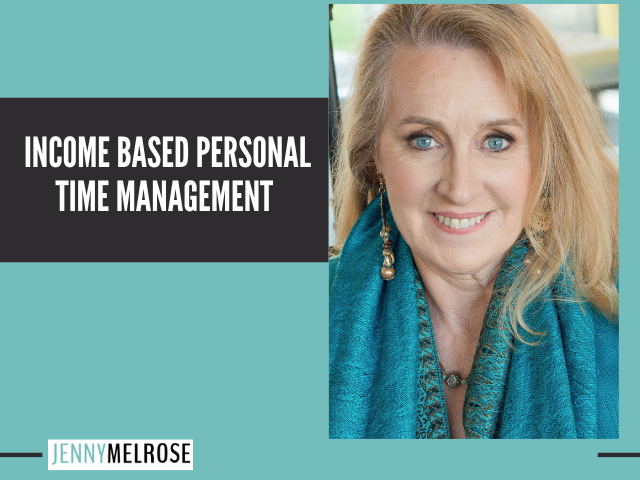Learn effective strategies to optimize your time and prioritize tasks based on their impact on your income with personal time management.
IE 371: Income Based Personal Time Management

Sherré DeMao is the CEO and founder of BizGrowthInc.com, a company that has been helping entrepreneurial businesses grow in value, worth, and prosperity for over 40 years.
Her company looks at corporate culture, operations, replicating success, building and enhancing value, being a preferred employer and service/goods provider, and other functions of a business.
They help companies validate what things work in their business and what things are not working. They focus on entrepreneurs and staying one step ahead of their needs to build their value and a company that others cannot imagine being without.
She helps others get an idea of what their company is capable of and its future potential.
Often, business owners invest so much time that they treat their business like a child. The dilemma with that is that a human child is raised to grow up and build a life of their own. Entrepreneurs sometimes build a business but do not allow it to thrive beyond what they are capable of.
BizGrowth believes that every business that is started can thrive beyond that entrepreneur given the right tools.
What is time management and why is it important?
One of the biggest areas entrepreneurs struggle with is time management. In 1995, Sherré had the mentality of “If only I had more time.” She shared with her office manager that she wished there were more hours in the day. The office manager’s advice was both invaluable and inspiring.
“You have the same amount of time as everyone else. It is just a matter of how you use it.”
None of us get more than 24 hours in a day. None of us less. It is the one asset that every person has equally.
Time management is energy management, priority management, and an asset that needs to be managed. You need a plan for how you use your time, leverage your time, and leverage other people’s time.
How can I assess my current time management skills?
Many times, people will tell you to make a list or various other things.
The first thing Sherré asks is “Do you hit the snooze button in the morning?” In meetings when this question is asked, 70% or more of people will say they hit the snooze button.
Most people do not know that when you hit the snooze button, you are not getting more sleep. Instead, you are telling your body that you didn’t get enough sleep. If you hit the snooze button instead of getting out of bed, your body feels more tired and not more rested.
You start the day off by delaying it. Try spending one week getting up immediately without hitting the snooze button and you will feel more energy. This is energy management.
The second question is for people who consider themselves “multitaskers.” Are you really multitasking or are you just moving things around?
Are you truly multitasking or are you being pulled in a million different directions and distracted so you are not getting things accomplished?
Another question is “Are you spending time doing the things you absolutely love doing?” The answer to this question should be an emphatic YES.
Are you spending time on things that you really don’t want to be spending time on but if you do not, you will feel guilty or obligated? Perhaps you are trying to make someone happy, are afraid to let go of something even though you do not enjoy it, or are fearful of losing control.
Are you micromanaging too much because you have to be involved in every little thing and stealing time away from yourself? This is wishful or fearful thinking.
Time is an asset. Time is energy and priority management.
Multitasking is not the best thing for your business. Batching is a better option to ensure you do not have to switch your thinking back and forth to different parts of your brain which slows you down. This costs you time.
Two statistics support this. Multitasking has been documented to cost people $450 million dollars per year. When you are trying to do different things, your brain stops/starts/stops/starts/stops/starts.
A good example of multitasking is listening to music while you are working out or crunching numbers. If you keep stopping to do other things while you are crunching numbers, you are probably going to make a mistake.
The other statistic that is fascinating is about procrastination. It costs companies and individuals a combined $650 billion dollars in late fees, longer terms with more interest, and other random costs.
How do we base our personal time management on income?
Sherré started looking at businesses that bill for their time (architectural, engineering, and accounting firms, for example) to assess this but she also began evaluating manufacturing facilities and other types of businesses.
Everyone in a company has value to your bottom line and profitability, including yourself. These are the five Income-Based Time Management assessment areas of focus:
- Income producing – Producing what you sell and delivering it.
- Income Generating – Marketing, promotions, sales calls, presentations, etc.
- Income Sustaining – Keeping the sales going through customer and vendor relations, your accounting, and cash flow management systems.
- Income Supporting – Anything that supports the operations. This might be equipment maintenance, accounting, human resources, and other departments in your company.
- Income Enhancing – Building value and worth in your company beyond you as the owner.
Only 35% of the workforce is fully engaged in their work because they do not feel appreciated or challenged enough. They are not being valued for the time they spend and the money they earn for companies. By looking at income-based time management
80 – 100% of leaders and CEOs in companies will say the following statement is true: I accept that certain positions within my company are just the cost of doing business and do not contribute to the bottom line.
When you ask the same question to team members within the company, the majority of them will say it is false. They know this is true because every person working in the company, including vendors, has value.
Their time is valuable and how they spend their time to help you produce and deliver your product is valuable. If you don’t see them as valuable, you are probably not treating them as valuable.
When we view this from a creator’s perspective as they put out content online and monetize through affiliate marketing or sponsorships, or their own products, they need to look at this as marketing efforts.
Social media, emails, etc. all contribute to income-based time management to determine what is valuable and what is not.
Creation of content, that attracts more sponsors and customers, is income producing, income generating, and ideally, income sustaining all at once.
If you are doing this effectively with proprietary aspects around it to distinguish them from everyone else, they are also creating income-enhancing aspects too. You are hitting all the buckets.
This is how entrepreneurial content creators need to think as they hire people on their team. You have to look at what they are producing, how that is moving your business forward, and how it affects you financially.
What are some things you need to consider when assessing your time management?
What do you love to do? What things do you prefer not to do?
When you are not doing what you love to do, your clients are not getting the best because your business model is sucking your time in areas you do not enjoy. You can put people in positions to do what they love and everyone can be happy.
Your time is extremely valuable. Everyone else’s time is also.
The biggest cautionary note here is when people start to think their time is more valuable than everyone else’s time other people know it and begin to disengage in the company.
What are 3 tips you can give for better personal time management?
When you call a dentist or doctor, they give you options for appointments. When you need to schedule a meeting with others, you can give 3-4 options that are good for you. Most of the time, that works with the other person. If not, they will offer options and you will figure it out. Use this method instead of going back and forth to give yourself more control of your time.
Blocking your time to do certain things on specific days and sticking to that schedule is important.
The biggest thing is being able to look at how you spend your time and identifying ways that you can release time that you don’t need to be spending. That is the first thing you need to do. How do you do that?
Once you develop your five buckets of time, you take the self-assessment to find out where you are spending your time, where your employees are spending their time, and what areas you and others in your company don’t need to be spending time.
Where are you spending your time and what percentage of the week are you using on those things?
Look at the five income categories and the hours you are working in each area and you can determine how lopsided you are in the different areas.
You might discover that you need to invest in a part-time person or outsource some things. You might need to hand off certain tasks completely.
Once you get that “A-Ha,” it is very powerful and your mind starts to shift from hiring people as expenses and that it becomes necessary because it is eating away at your time that is income producing, income generating, or income enhancing.
Wishful and Fearful Thinking Assessment & Income-Based Time Management Assessment
This is about the wishful and fearful thinking that applies to everyone and holds people back. A lot of those wishful and fearful thinking factors have a direct impact on how you approach your time.
Perhaps you have a fear of losing control. As a result, you are micromanaging everything, probably multitasking ridiculously, focusing on everyone else’s business, and not getting your own work done.
The things you want to get done but are not able to do are called “inactive control.” They are in your control but nothing is happening.
What do you need to stop micromanaging? You do things because you think you are good at it when in reality you are afraid of letting go, even when you are not enjoying them.
Even if this is something you can do in your sleep, if there is someone else who can be doing it so you can focus on a higher dollar value task, it is worth letting someone else do it.
Wishful thinking is “if only I had more time or support or confidence.” If you don’t have the confidence you need, you might be afraid to ask for help. You might be afraid to admit you don’t know how to do something.
As a result, you are struggling and spending more time on something than you need to when you could have just gotten some support. You could have invested in a class to learn instead of struggling to figure it out yourself.
These are subconscious aspects that are impacting your time management. You need awareness of the “if only I had more time” thoughts or the fear factors.
Download the Wishful and Fearful Thinking Assessment today!
Action Steps:
- If you liked this episode of Influencer Entrepreneurs, please subscribe and leave a fabulous review!
- Join the conversation on Instagram by tagging Jenny when you’re listening to the podcast. She’ll send you a personal message whenever you tag her.


